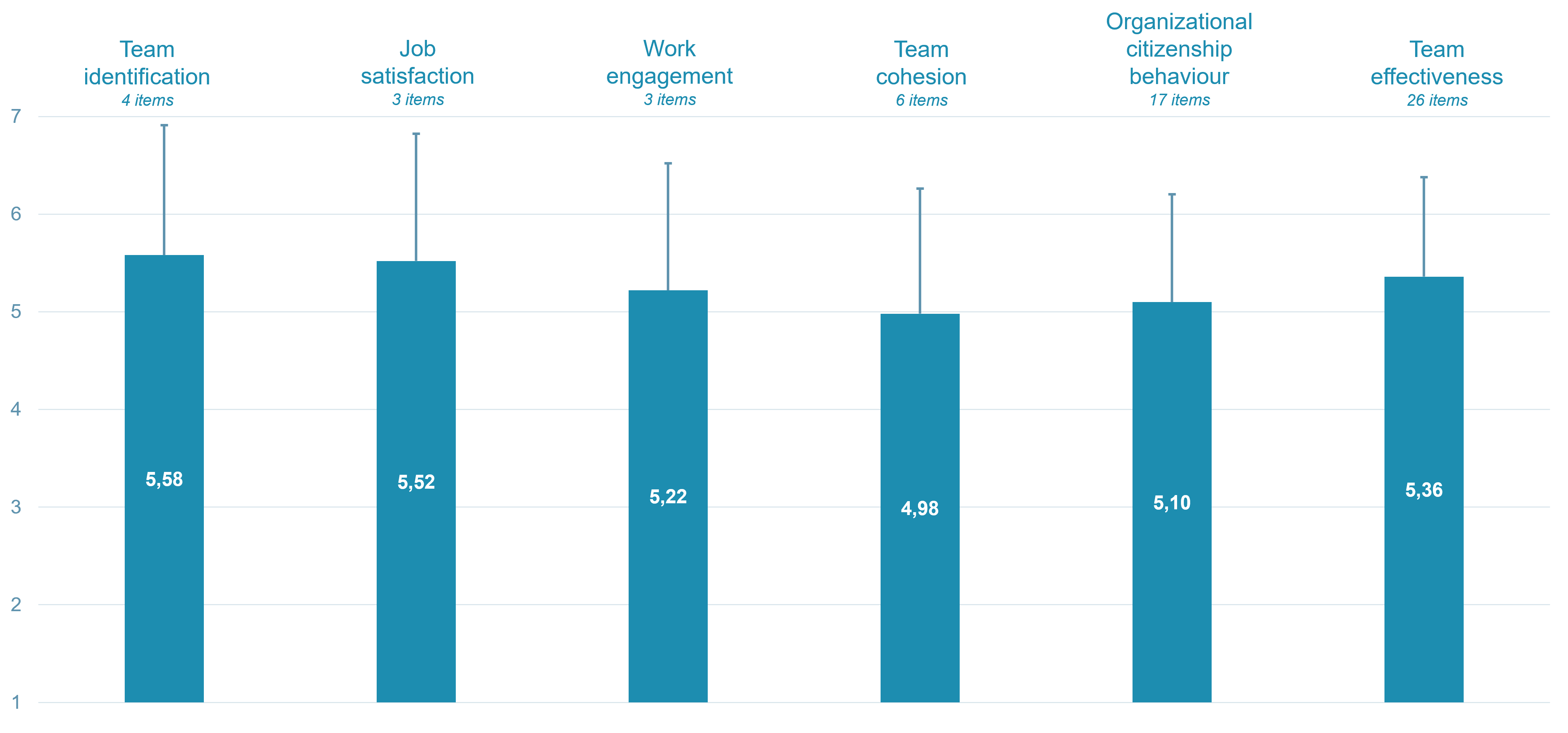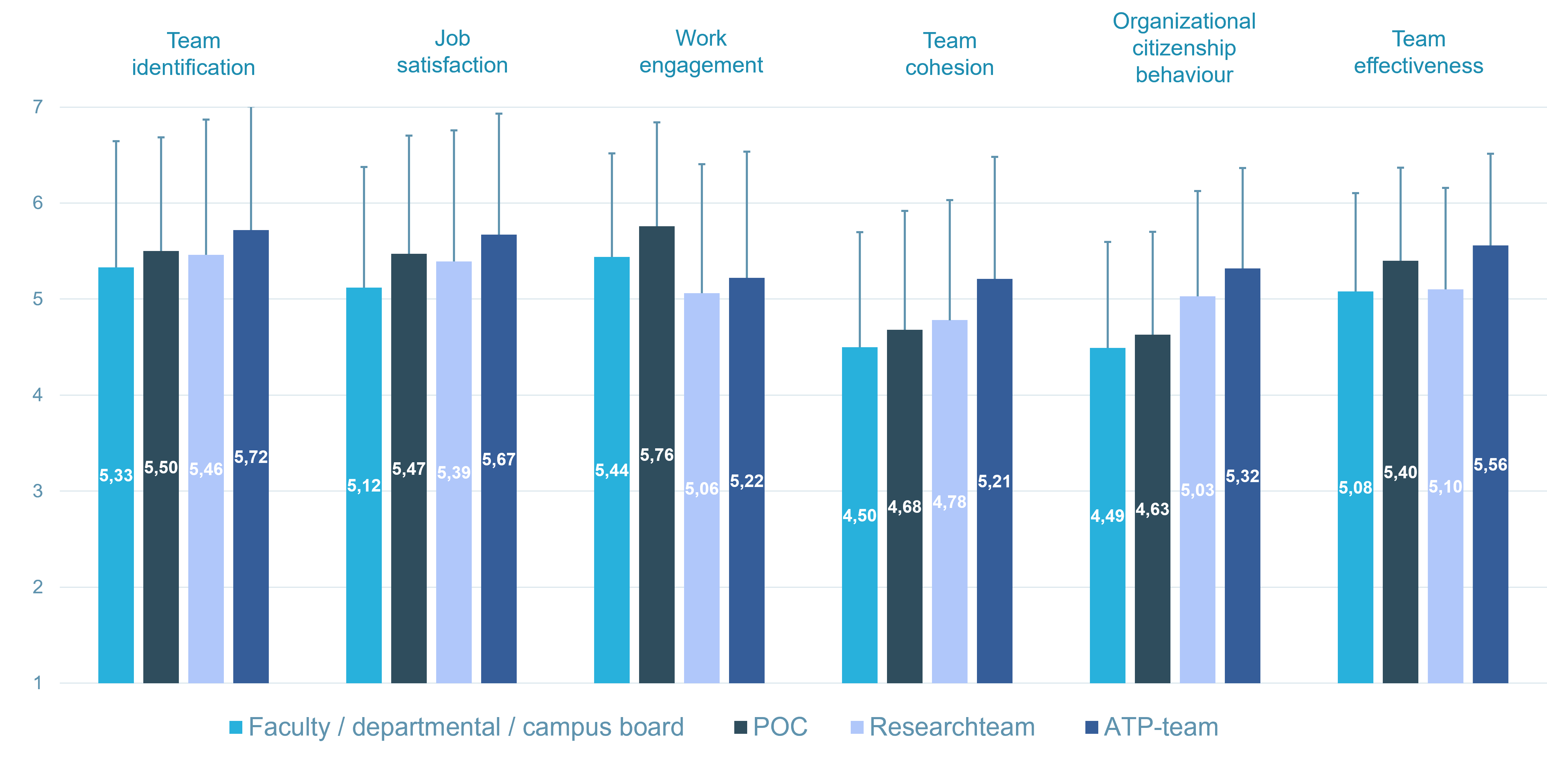Team identification
Doosje, Bertjan & Ellemers, Naomi & Spears, Russell. (1995). Perceived Intragroup Variability as a Function of Group Status and Identification. Journal of Experimental Social Psychology. 31. 410-436. 10.1006/jesp.1995.1018.
Likert scale ranging from 1 to 7, Cronbach’s alpha = .91
- I see myself as a part of this team.
- I am glad to be a part of this team.
- I feel strong ties with other members of this team.
- I identify with this team.
Job satisfaction
Hackman, J. R., & Oldham, G. R. (1976). Motivation through the design of work: Test of a theory. Organizational behavior and human performance, 16(2), 250-279.
Likert scale ranging from 1 to 7, Cronbach’s alpha = .87
- Generally speaking, I am very satisfied in this team.
- Generally speaking, I like being with this team.
- I am generally satisfied with the kind of work I do in this team.
Work engagement
Schaufeli, W. B., Shimazu, A., Hakanen, J., Salanova, M., & De Witte, H. (2019). An ultra-short measure for work engagement: The UWES-3 validation across five countries. European Journal of Psychological Assessment, 35(4), 577-591.
Likert scale ranging from 1 to 7, Cronbach’s alpha = .89
- At my work, I feel bursting with energy.
- I am enthusiastic about my job.
- I am immersed in my work.
Team cohesion
Mathieu, J. E., Kukenberger, M. R., D'innocenzo, L., & Reilly, G. (2015). Modeling reciprocal team cohesion–performance relationships, as impacted by shared leadership and members’ competence. Journal of Applied Psychology, 100(3), 713.
Likert scale ranging from 1 to 7, Cronbach’s alpha = .93
- There is a feeling of unity and cohesion in my team.
- There is a strong feeling of belongingness among my team members.
- Members of my team feel close to each other.
- Members of my team share a focus on our work.
- My team concentrates on getting things done.
- My team members pull together to accomplish work.
Organizational citizenship behaviour
Lee, K., & Allen, N. J. (2002). Organizational citizenship behavior and workplace deviance: the role of affect and cognitions. Journal of applied psychology, 87(1), 131.
Likert scale ranging from 1 to 7, Cronbach’s alpha = .95
- The various members within my team ...
- help others who have been absent.
- willingly give their time to help others who have work-related problems.
- adjust their work schedule to accommodate other employees’ requests for time off.
- go out of the way to make newer employees feel welcome in the work group.
- show genuine concern and courtesy toward co-workers, even under the most trying business or personal situations.
- give up time to help others who have work or nonwork problems.
- assist others with their duties.
- share personal property with others to help their work.
- attend functions that are not required but that help the image of our team.
- keep up with developments in our team.
- defend our team when other employees criticize it.
- show pride when representing our team in public.
- offer ideas to improve the functioning of our team.
- express loyalty toward our team.
- take action to protect our team from potential problems.
- demonstrate concern about the image of our team.
- attend functions that are not required but that help the image of the university.
Team effectiveness
Pearce, C. L., & Sims Jr, H. P. (2002). Vertical versus shared leadership as predictors of the effectiveness of change management teams: An examination of aversive, directive, transactional, transformational, and empowering leader behaviours. Group dynamics: Theory, research, and practice, 6(2), 172.
Likert scale ranging from 1 to 7, Cronbach’s alpha = .97
- The team delivers its commitments.
- The quality of the team’s output is very high.
- The team faces new problems effectively.
- The team sets goals and priorities for maximum efficiency.
- The team communicates its progress.
- The team’s contribution to the university is very valuable.
- The team is highly effective.
- The team delivers its commitments on time.
- The team performs duties accurately and consistently.
- The team changes behaviour to meet the demands of the situation.
- The team develops workable plans.
- The team proactively communicates its progress.
- The team makes valuable contributions to the university.
- The team is making very good progress on the team’s charter.
- The team provides a volume of work consistent with established standards.
- The team eliminates root problems, not just symptoms.
- The team copes with change very well.
- The team works on important problems.
- The team keeps everyone informed.
- The contributions of this team are very valuable to the university.
- The team does very good work.
- The team is highly effective at implementing solutions.
- The team has its priorities straight.
- The team keeps everyone informed on its progress.
- The team does a very good job.
- The team delivers important changes.


